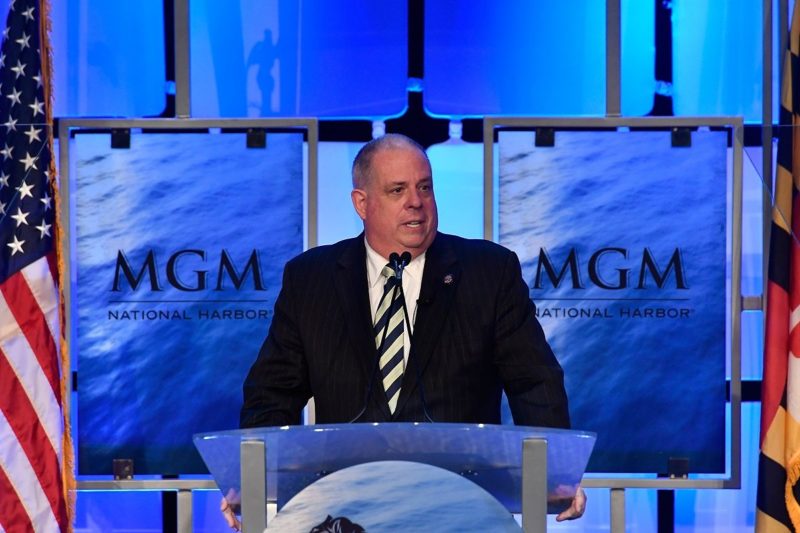Maryland Governor Takes Atypical GOP Approach to Reproductive Rights
Polls suggest Larry Hogan, a GOP governor in a blue state, is the country's second most popular governor, but reproductive rights activists remain skeptical.

Maryland recently became the first state to pass a law reimbursing its Planned Parenthood clinics if Republicans in Congress cuts their funding.
Maryland’s governing bodies are largely pro-choice. Unlike many states, it voluntarily funds medically necessary abortions for Medicaid enrollees, and does not mandate counseling or waiting periods for abortion care. The state witnessed a 21 percent increase in abortion providers from 2011 to 2014, bucking a national downward trend.
This makes sense in light of Maryland’s long history of Democratic leadership; Democratic governors ran the state from 1969 to 2015 (with the exception of Bob Ehrlich Jr., who served from 2003-2007), during which time the lion’s share of the state’s abortions laws were set.
But this latest legislation—arguably the most proactive reproductive health bill in Maryland—was passed under Larry Hogan, a first-term GOP governor.
Hogan did not sign the legislation. He let it become law without his John Hancock, along with 14 other bills. Under the Maryland Constitution, a bill may become law without the governor’s signature so long as s/he doesn’t return it to the General Assembly with objections within six days of it being presented. It’s important to note the Democratic-controlled General Assembly can overturn Hogan vetoes.
The bill’s sponsor, state Sen. Richard S. Madaleno Jr. (D-Montgomery), told the Washington Post he was disappointed Hogan chose not to sign the bill. “Today, Maryland makes history … unfortunately without the support of the governor. While I wish our state didn’t need to fight the attacks on comprehensive health care by Congress, we are proud to stand up and protect access in Maryland.”
But Hogan’s silence may not be a clear-cut stamp of approval (or lack thereof). It may be his way of positioning for re-election in a blue state where people overwhelmingly supports the services Planned Parenthood provides.
While the governor is personally opposed to abortion rights, he campaigned on a promise that “he will not try to change Maryland’s laws protecting women’s rights to the procedure nor to limit access to contraception.” So far he has kept his word, and has proven to be a supporter of contraception initiatives; in May 2016, Hogan signed the most expansive birth control bill in the country.
But not rolling back existing laws and not objecting to a new, pro-family planning law are two different things. Hogan could have vetoed the Planned Parenthood funding bill as a symbolic gesture without compromising his promise to leave established law in tact.
The governor’s office did not respond for comment by publication time.
Hogan is a centrist—a strategic necessity for a GOP governor in a state that went to Hillary Clinton by 30 points in the 2016 presidential election—and his popularity is reportedly sky-high. Hogan has held the center in a variety of ways, including support for a ban on fracking and paid sick leave, and refusing to endorse Donald Trump for president last year.
Hogan is halfway through his four-year term, the point at which incumbents begin planning for re-election, and his centrist leanings are paying off. Hogan is the nation’s second most popular governor, behind only Charlie Baker of Massachusetts, another Republican in a heavily Democratic state, according to Morning Consult Governor Approval rankings. Seventy-three percent of respondents approved of Hogan’s performance.
Some abortion rights advocates remain skeptical. “Governor Hogan has yet to put forth a legislative agenda pertaining to ‘social issues’ in order to stay out of the line of fire,” Diana Philip, executive director of NARAL Pro-Choice Maryland, told Rewire. “However, his office did recently fail to vet a consumer advocate nominee for the Maryland Board of Physicians that was an obvious biased, anti-choice activist.”
Within 24 hours of NARAL’s online campaign opposing the nomination, Hogan withdrew it, reportedly at the nominee’s request. Hogan seemed irked at the public pressure NARAL mounted, telling the Washington Post, “Just because the woman happens to be pro-life instead of pro-choice wasn’t a reason to attack her.”
For many Democrats, abortion access is inextricably linked to all other human rights issues, including economic justice—a point that has gained renewed attention as the Democratic National Committee appears willing to back anti-choice candidates.
While Philip doubts Hogan will take advantage of a congressional rule change enabling states to withhold federal money for family planning services, she wonders if conservative Republicans in power will try to influence him. “It will be interesting to see how much pressure the GOP puts on him to do so, but since he remains a popular governor, they may leave him alone to strengthen his chances for re-election.”
In the meantime, pro-choice advocates expect Hogan will sign a bill authorizing pharmacists to prescribe and dispense contraceptives. “No abortion care related bills are placed before him for signature, either to limit or expand access, so he appears to feel safe enough in supporting measures to improve access to contraception,” Philip said.
